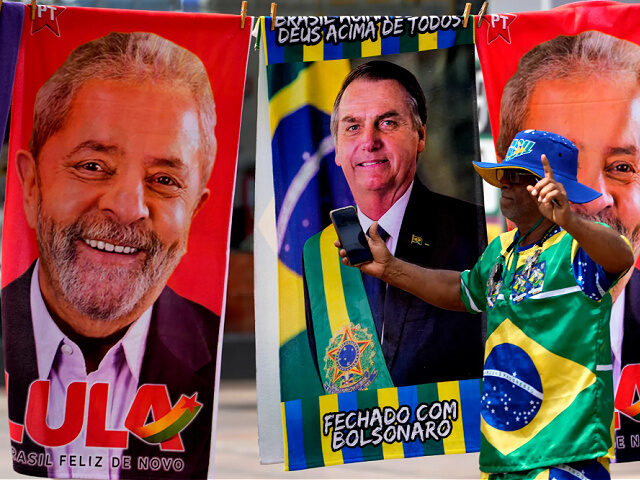President Jair Bolsonaro of Brazil and his rival for the nation’s top office, socialist former President Luiz Inácio Lula da Silva, will meet for a final debate on Friday before voters choose their next head of state on Sunday.
Observers expect a heated competition on the mainstream television network Globo Friday night following the last debate, where both candidates called each other liars, Bolsonaro declaring Lula, a convicted felon, a “national shame,” and Lula warning that Bolsonaro serving a second term could mean the end of democracy in the country.
The nation’s top election authority, the Superior Electoral Tribunal (TSE), has since banned public descriptions of Lula as “corrupt” or a “thief,” despite having previously been sentenced to 25 years in prison after being found guilty of buying a luxury home with bribe money. The nation’s top court, the Supreme Federal Tribunal (STF), overturned the conviction last year, allowing Lula to run for president.
Outside of the formal setting of the debate stage, Bolsonaro and Lula have engaged in arguably the dirtiest political campaign in the world this year. Bolsonaro has faced spurious accusations of cannibalism and pedophilia – Lula personally accused Bolsonaro of “pedophile behavior” on a recent podcast – while Bolsonaro supporters have accused Lula of worshipping pagan gods and making deals with Satan.
Adding to the chaos is the case of Roberto Jefferson, a center-left former lawmaker who opened fired and hurled a grenade at police officers last week after the STF ordered his arrest over political commentary in a Youtube video. Lula supporters attempted to tie Jefferson to Bolsonaro, resulting in the nation’s electoral authority censoring those attacks. Lula himself then prompted attacked the police for being “condescending” to Jefferson during his arrest, an apparent endorsement of his behavior.

Brazil’s former President Luiz Inacio Lula da Silva, who is running for office again, left, faces Jair Bolsonaro in a presidential debate at Bandeirantes Television in Sao Paulo, Brazil, Sunday, Oct. 16, 2022. The presidential runoff election is set for Oct. 30. (Marcelo Chello/AP)
The latest polls released on Thursday and Friday show Lula with a slight lead over Bolsonaro. The left-leaning firm Datafolha found 49 percent of respondents intending to vote for Lula and 45 percent for Bolsonaro on Thursday. An online poll by another firm, AtlasIntel, found Lula enjoying 53.2 percent support against Bolsonaro’s 46.8 percent as of Thursday. The Gerp polling firm, in contrast, found Bolsonaro leading with 47 percent of the vote against Bolsonaro’s 43 percent, a lead larger than the poll’s margin of error.
Polls were notoriously inaccurate in predicting the first round of voting in Brazil. Brazilians first went to the ballot box – choosing among the two current candidates and a host of other, less popular ones – on October 2. The country’s rules require a candidate to receive over 50 percent of the vote in the first round to be elected president without a runoff election. Lula failed to meet this threshold, receiving 48 percent of the vote. Bolsonaro received 43 percent of the vote, earning him his slot in the runoff on Sunday.
Prior to that election Datafolha predicted that Lula would defeat Bolsonaro by 14 points. Others similarly suggested that a second round of voting would not be necessary.
The closeness of the race appeared to prompt a new level of intensity and a wave of negative campaigning on both sides that largely side-stepped the main issues affecting Brazilians today, such as the economy, corruption, the state of the healthcare system after the Chinese coronavirus pandemic, education, and policies to protect the Amazon Rainforest.
Days after the first election, social media erupted with videos appearing to show Satanists engaging in sorcery to “help” Lula win the election. Bolsonaro supporters, many of whom are Evangelical Christians, shared the videos with outrage, associating them with an event at which Lula met with followers of African paganism and received an artifact associated with Changó, the Nigerian Yoruba god of war, fire, and thunder.
“Lula believes in God and is Christian. Lula does not have a pact and has never had a conversation with the devil,” a social media account for the Lula campaign was forced to clarify in a public statement.
Following the Satanism scare, Bolsonaro has borne the brunt of the most bizarre negative attacks in the race. The Lula campaign used government-allotted television time later that week to air a 2016 interview that Bolsonaro had posted at the time to his Youtube account in which he discusses his time in the military. In the interview, which occurred when he was serving in the lower chamber of the Brazilian Congress, he claims to have served deep in the Amazon Rainforest and encountered an indigenous cannibal tribe.
“The Indian died and they were cooking him. They cook the Indian; that’s their culture,” he claimed. “They cook him for two or three days and they eat him with banana. I wanted to go see the Indian be cooked and a guy said, ‘if you go, you have to eat.’ So from there, I said, I eat!”
“Nobody wanted to go because they had to eat the Indian, [and] they didn’t want me to go alone, so I didn’t go,” he concluded.
Resurfacing the old interview prompted a wave of leftists attacking Bolsonaro for allegedly being a cannibal through social media hashtags. Bolsonaro appealed to the TSE to censor Lula campaign content calling him a cannibal due to being “out of context” and “fake news.”
Lula moved on from the cannibalism accusations to calling Bolsonaro a pedophile.
These claims surfaced from another interview Bolsonaro made in which he described seen Venezuelan teen girls while campaigning apparently engaging in prostitution. Bolsonaro was lamenting the state of the girls and the socialist policies that resulted in their alleged misfortune.
“I was in Brasilia. … I stopped the motorcycle on a corner, took off my helmet, and looked at some little girls. … Three, four, beautiful, 14, 15 years old, tidy,” Bolsonaro said. “It created an atmosphere, [so] I turned around. ‘Can I come into your house?’”
He later added that the girls were “getting ready … to make a living.” Lula supporters, and Lula himself, claimed that Bolsonaro’s use of the term “created an atmosphere” meant that he perceived sexual tension between himself and the girls.
“His behavior now, in the case of the Venezuelan girls, is the behavior of a pedophile,” Lula said last week on the Brazilian podcast Flow. “That is why he was terrified and tried to explain himself as quickly as possible.”
The TSE has done little to censor Lula’s claims, but has moved to silence Bolsonaro supporters calling Lula “corrupt.”
The Roberto Jefferson episode is closely tied to the issue of Supreme Court censorship. The TSE is currently run by Alexandre de Moraes, the top judge, or minister, on the STF. De Moraes has led an “anti-fake news” campaign from the court for years, abusing his power to order violent raids against a host of Brazilian citizens, overwhemingly Bolsonaro supporters, on charges of alleged “fake news” (there is no “fake news” crime on the books in Brazil). Jefferson is the exception, a member of Brazil’s Labor Party, a center-left party largely eradicated by Lula’s Workers’ Party (PT). Jefferson was already on house arrest this weekend on charges of spreading “fake news” when his daughter published a video to his social media accounts in which he called STF Minister Cármen Lúcia a “prostitute” and “Cármen Lucifer.” De Moraes deemed the video a violation of his house arrest provisions and sent police to his home to take him into custody, where Jefferson responded with a grenade.
“What happened to Mr. Roberto Jefferson, he should have been arrested,” Lula said during a presidential campaign Q&A event on social media Tuesday. “The Federal Police, in my opinion, did not act correctly. They were condescending to him.”
In contrast, Bolsonaro categorically referred to Jefferson and a “criminal” and offered a full-throated defense of the police.
The Jefferson affair will likely feature in Friday night’s debate, though whether or not it will swing any votes remains to be seen.

COMMENTS
Please let us know if you're having issues with commenting.